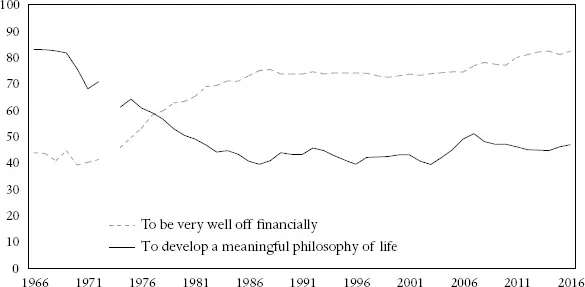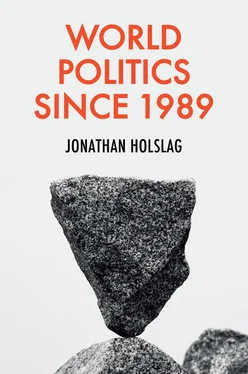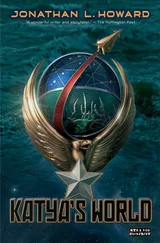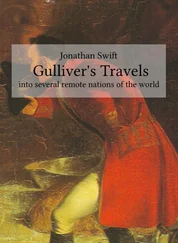A first source of uncertainty about the ability of the West to preserve its power and its position at the center of world politics concerned, thus, the downside of neoliberalism. The retreat of the state, advocated by politicians like Ronald Reagan and Margaret Thatcher, had affected the vital tissue of American and British society. The shopping malls erected against the backdrop of decaying public infrastructure, manufacturing, and schools also exemplified how much this neoliberalism strayed from the Enlightenment beliefs that lay at the origins of liberal thought. Whereas the original liberal thinkers emphasized the need for the emancipation of the mind and civilization, this neoliberalism was about the creation and satisfaction of new material needs. Statesmen in the past stressed the importance of active citizenship and of education. “Patriotism, virtue and wisdom,” one reads in the Federalist Papers. 22Neoliberalism reduced citizens to consumers. It did not set them free, nor empower them, as some neoliberal intellectuals maintained. Instead, it left them to the influence of corporate Leviathans, their advertisements, their role models, and the banality of their media channels.
Previous generations of leaders called for frugality. But now, families and nations spent beyond their means. In previous times, also, leaders warned against the sort of capitalism that bred large inequality and ignored the objective of a strong society. “It is a bad thing for a nation to admire the false standard of success and there can be no falser standard than that set by the deification of material wealth,” President Theodore Roosevelt had warned. 23Was Western society even that free? Soviet citizens lived in a dictatorship that denied them fundamental freedoms, including the freedom to choose how to live their lives. While these freedoms were guaranteed in the West, Westerners had come to face some serious challenges concerning their own lives, in particular the moral dimension of their lives. On the one hand, they ended up living in a system that educated them less about morals and citizenship, yet, on the other hand, heavily influenced by commercial publicity, powerful retail chains, and mass media with their own ideas of what lifestyle ought to be. There were, of course, differences inside the West, but in the core of the Western world – the United States and the United Kingdom – neoliberalism had made the spirit of the Founding Fathers and the liberal ideal of emancipation fall on many citizens like a worn-out cloak. It surely was not always better in the past, but many wondered whether the abandoning of the ideals would help build a better future.
Wealth without virtue breads decadence. Decadence in its turn is the precursor of decline. Historians who had studied the rise and fall of great powers saw resemblances between the internal weakening of the late Roman Empire and the West. They were also familiar with the words of the Roman historian Sallust and theologian Saint Augustine that the abolition of external adversaries and the removal of the necessity to be alert was followed by disasters arising from prosperity, greed, and inequality. 24So, if the collapse of the Soviet Union already presented an opportunity, it would at best be a pause in which to remedy these internal economic problems. 25
Even such pause was considered by some to be more a curse than a blessing. The problem of a breathing space, contended the historian Paul Kennedy, is that one feels less pressured to tackle challenges. 26He made a comparison with the late-Victorian age, during and after which Britain constantly staggered from one crisis to the next. Decline is not necessarily a collapse. Decline can also be slow, with moments of recovery that allow politicians to dismiss the warnings of critics. Decline can be subtle, encouraging leaders to go on with laissez-faire policies, and citizens to enjoy their prosperity without worrying about the erosion of their productivity and wealth. The harsh confrontation with reality is thereby postponed for another generation or so. Kennedy, who in earlier years investigated the phenomenon of imperial overstretch, the fact that global interests were growing too much in comparison to the means to secure them, now highlighted the moral dimension. Like many historians who wrote about the fate of great powers, he saw decadence as the main threat, describing his country drifting lazily downstream, putting out the boathook to avoid an occasional collision.
Moral decay was also what the influential economist John Kenneth Galbraith saw around him. He had previously outlined how a small part of private America had become outrageously rich, while the public sector remained outrageously poor. The problem, he saw, was economics. But the cause was the dissipating of virtue and ethics, the erosion of the values that America’s Founding Fathers embodied. Materialism among youngsters was on the rise, as figure 2.1 shows. Other virtues, like the pursuit of a meaningful philosophy in life, retreated. “Whether the problem be that of a burgeoning population and of space in which to live with peace and grace, or whether it be the depletion of the materials which nature has stocked in the earth’s crust and which have been drawn upon more heavily in this century than in all previous time together, or whether it be that of occupying minds no longer committed to the stockpiling of consumer goods,” he advocated, “the basic demand on America will be on its resources of intelligence, and education.” 27Hence, without educational renaissance, without moral renaissance, and without morals and virtue, no power can go on to lead.

Figure 2.1 The purpose of studying among American university students (%)
Source: UCLA Freshmen Survey.
Whole generations had learned to hate communism, yet not to understand democracy. In 1990, only about 6 percent of American high school students had a proper understanding of their country’s institutions. The majority did not know that Congress made laws, or what checks and balances were about. 28The philosopher Alan Bloom found a dismal lack of critical thought. He called it the closing of the American mind. 29American students might not have faced the propaganda and the censorship, but they were not sufficiently equipped to treat information critically either. Hence, they could be more inclined to advance understanding through basic instincts than through logic and critical thinking. Absent the clear rival of the Cold War, citizens were left with abstract ideas of good and evil, and a poor understanding of the common good.
There was more. Francis Fukuyama, a professor who had famously declared the victory of liberalism, cautioned that the victory of liberalism could be devastating. Instead of being triumphalist, his essay “The End of History” predicted that this moment would presage a somber time. The more liberalism and postmodernism advanced, he asserted, the more they would elicit nostalgia for the time when history existed, the time that called for daring, courage, imagination, and idealism. 30Human beings, he tried to say, expected more of life than just economic calculation, the solving of technical problems, and the satisfaction of consumer demands. This harkened back to the thinking of the European existentialists in between the two world wars. They saw in the progress of materialism a risk of both radicalism and decline, of a society of primitive socialized men without identity, sometimes leisurely consuming, at other times feverishly searching for an affirmation of one’s corner. 31Thus he wrote:
Читать дальше


![Деннис Лихэйн - Когда под ногами бездна [Since We Fell ru]](/books/25722/dennis-lihejn-kogda-pod-nogami-bezdna-since-we-fe-thumb.webp)










